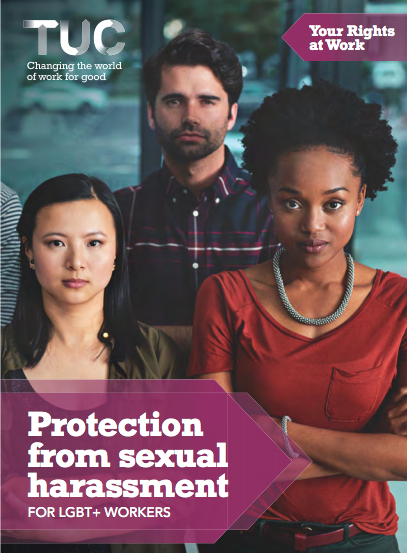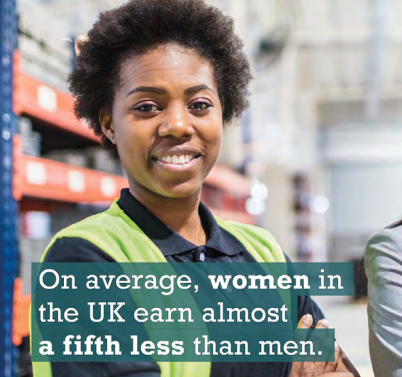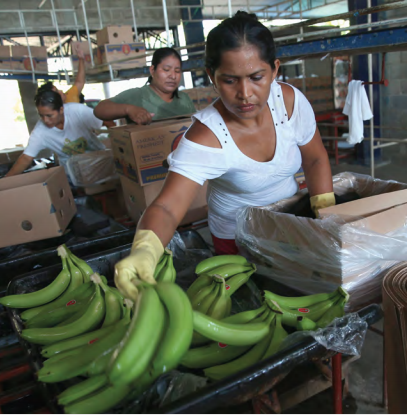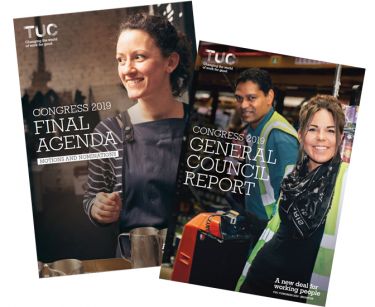General Council Report 2019
3.1 Introduction
Over the year the General Council has worked to build and promote union voice and campaign for respect at work. As covered in Section 1, work to develop and promote collective bargaining continues to be a significant priority, alongside other activity on respect and a voice at work.
3.2 Special feature: combating the far rightTackling the far right has been a major priority for the General Council over the past year. Far-right activity and visibility are growing. Such activity seeks to exploit the divisions laid bare by the 2016 referendum and ongoing uncertainty around Brexit in a context of wage stagnation, insecure work and public service cuts in Britain, and a resurgent international far right. They are mobilising significant numbers to some of their demonstrations, growing in strength and influence online, and linking with groups around Europe. The far right are promoting a highly divisive and racist agenda, often with a particular focus on Islamophobia, antisemitism and anti-migrant sentiment, but with wide-reaching consequences across all of our communities. We are also seeing the continuing rise of the anti-feminist movement, which finds a home in the virulently anti-women views and policies of the far right. The far right have also targeted disabled and LGBT+ people. The trade union movement has always been at the forefront of activity to oppose fascism and racism. We are well-placed to challenge the far right’s claim to speak for working people and address the ever-growing encroachment of far-right ideology into mainstream public life. Based on a strategy agreed by the General Council, the TUC has delivered a range of work domestically and internationally aimed at building a platform to challenge far-right ideologies in workplaces, on the streets and online. The TUC’s work on combating the far right sits alongside and is closely linked to our wider campaigns to tackle racism and promote equality and diversity in our workplaces and communities. In line with emergency resolution 6 and resolution 44, the General Council supported large-scale national-level demonstrations of opposition to racism and fascism. We worked with partners on both the National Unity Demonstration on 17 November 2018 and the UN Anti-Racism Day demonstration on 16 March 2019. The UN Anti-Racism Day demonstration in the UK linked with similar events in 22 other countries as part of an internationally coordinated expression of anti-racist solidarity. The march paid visits to the French, Austrian, Hungarian, German and Brazilian Embassies to show solidarity with those resisting the growing far-right in those countries. The TUC coordinated social media activity with affiliates to maximise reach and used social media channels to share a well-received video that set out the deep roots of the trade union movement in standing against fascism, and for working people. Far-right ideologies came into particular prominence during the European parliamentary election campaign, with a number of high-profile candidates promoting far-right messages. In order to combat hate speech and remind candidates of their legal obligations, the TUC built and led a coalition of over 30 organisations in a public statement, asking all politicians and candidates to ensure they stood against hate speech during and after the election period. The TUC, community groups, human rights organisations and charities also urged local authorities to publicly correct false claims made by candidates and parties that could stir up divisions in their communities. The TUC is producing a suite of materials to build union reps’ knowledge and confidence to challenge far-right activity and views in the workplace. In April, as part of this, we launched an online training resource on combating the far right that included information on holding transformative conversations, which we continue to promote widely. TUC regions have begun to run training sessions to support union reps and activists in organising against the far right, including online organising and positively handling the difficult conversations involved in challenging racist and far-right views in the workplace. These will be completed by December 2019. We also ran well-attended sessions on combating the far right at the Young Workers Conference and Black Workers Conference. The TUC has created a closed Facebook group for those who have completed the e-learning and attended regional sessions and other engaged activists to share intelligence and experiences of their work in challenging far-right activity. Through this we aim to build stronger links between activists, create safe, online spaces to organise and build a sustainable network of individuals who can share information and insights. The TUC is working with the ITUC and ETUC to gather information about far-right activity in other countries. We are keen to better understand the internationalisation of the far right, looking at ideology, tactics, funding, social media, and the mainstreaming of xenophobic and far-right ideas, and sharing international examples of successful initiatives against them. In April, the TUC attended the ITUC Women’s Committee, where unions shared information about initiatives and discussed ways of tackling a range of discrimination including xenophobia and far-right activity. The TUC wants to ensure that all our work is underpinned by a sound evidence base, using messages proven to be effective in combating far-right narratives. As part of this, we are working with the Joseph Rowntree Foundation (JRF) to better understand the experiences and views of low- and middle-income workers to inform a public-facing campaign aimed at unifying positive action for working people and their communities. The TUC, with support from the JRF, carried out polling and focus groups with low- and middle-income workers from across the country. We are using the results to develop a narrative and language that takes account of people’s lived experience and unifies people around positive solutions to the UK’s social and economic challenges. |
Tackling the far right continues to be a major focus, as has our work on employment and union rights, skills, equality, health and safety at work and migration.
3.3 Employment and trade union rights
The TUC has been at the forefront of fighting for improvements to workers’ rights, and for workers to be able to exercise the employment rights that they are entitled to.
As well as work on the overall framework of rights, the TUC has continued to campaign to ensure a stronger framework for employment rights. We briefed MPs on government statutory instruments seeking to implement aspects of its Good Work Plan, stemming from the Taylor Review. In particular we supported the ending of Swedish derogation contracts, which were used as a loophole to avoid giving agency workers equal pay, although we sought to bring forward their abolition. We also supported the right to a written statement of terms and conditions from day one of employment for all workers.
We have also continued to push for strong enforcement of rights, meeting regularly with the Director for Labour Market Enforcement, the GLAA, HMRC and the Employment Agency Standards Inspectorate, pushing government to increase the resources for enforcement, including of employment agencies, and engaging with the Labour Party in the development of its proposals for a Ministry of Labour.
In May, the TUC published an indepth study that showed shocking levels of sexual harassment of LGBT+ people at work.
These have included the right to work flexibly, the right to be free of harassment and free from inappropriate investigation by the police and for the rights of trade unions to be provided with information.
In line with resolution 23, we’ve lobbied for an overhaul of the right to request flexible work. The TUC has been an active participant in the flexible working taskforce established by the Department for Business, Energy and Industrial Strategy (BEIS).
We have used our participation in this taskforce to argue that jobs should be advertised as flexible unless the employer can prove exceptional circumstances. People should have the right to work flexibility from their first day of employment.
Participation in the BEIS taskforce enabled the TUC to highlight evidence put forward by affiliated unions that demonstrates the failures of existing legislation. In particular, we emphasised that unsuccessful applicants have no appeal route, and that employers have excessive levels of discretion to turn down a flexible working request.
In summer 2019 the General Council endorsed the New Deal Charter. This includes an updated policy on flexible work, which stipulates that when employers advertise new vacancies, they should be required to set out which flexible working arrangements apply, unless they can prove exceptional circumstances.
Throughout the year, the TUC has continued its work to protect people from bullying and harassment at work. Sexual harassment, along with other forms of workplace harassment, has remained high on our agenda.
In line with resolutions 24, 36 and composite 5 we have worked with affiliates and partner organisations to campaign for measures to tackle harassment at work. We have put forward the case for a new legal duty on employers to proactively prevent harassment and victimisation at work. In June 2019 we launched our #ThisIsNotWorking campaign, a coalition of unions, women’s and LGBT+ organisations and other NGOs. This highlighted the inadequacy of the current legislative framework and the benefits of a preventative duty, particularly for sectors with high levels of freelance workers.

In May, the TUC published an in-depth study that showed shocking levels of sexual harassment of LGBT+ people at work. Nearly 7 in 10 (68 per cent) lesbian, gay, bisexual and trans (LGBT+) people have been sexually harassed at work. To support efforts to address this, we published updated guidance on identifying and addressing sexual harassment of LGBT+ people in the workplace.
We have also been developing our policy on the use of non-disclosure agreements in cases of workplace harassment and discrimination in order to secure reforms to the law that will ensure workers can more freely report and talk about their experiences. In March 2019, the TUC gave oral evidence to the Women and Equalities Select Committee on the use of non-disclosure agreements and a month later we submitted our response to the BEIS consultation on measures to prevent misuse of confidentiality clauses in situations of workplace harassment or discrimination.
In response to the May 2018 implementation of the EU General Data Protection Regulation (GDPR), the TUC established a forum for union officials with a responsibility for data protection to discuss the implications, and new obligations, arising from the GDPR. The network has met three times and has helped unions to understand the practical implications of GDPR and the implications for their work, in line with resolution 71.
The forum has helped unions meet experts in the field, discuss data protection issues that are specific to unions, and share best practice including innovative technological solutions. In addition, TUC Education ran a webinar to help workplace reps prepare for GDPR. The TUC plans to publish a GDPR bargaining guide for union reps in late 2019, focusing on the requirements and minimum standards employers must meet. The aim of is to ensure that employers do not misuse workforce data to disadvantage workers.
In line with emergency resolution 3, the TUC supported the National Union of Journalists’ campaign condemning the arrest of Belfast-based journalists Trevor Birney and Barry McCaffrey following the making of their film No Stone Unturned. The documentary investigated the murder of six Catholics in Loughinisland, County Down, in 1994. The TUC met with the NUJ to discuss the campaign and promoted a film screening event to support the campaign. The TUC welcomed the confirmation in June that the Police Service of Northern Ireland (PSNI) and Durham Constabulary have dropped the criminal inquiry relating to Trevor Birney and Barry McCaffrey. This came shortly after the Lord Chief Justice ruled search warrants used by police had been “inappropriate”.

3.4 Equalities
The General Council has worked throughout the year to promote equality at work and to tackle discrimination. We have built on the findings of the Equality Audit published at Congress 2018, briefing the TUC’s equality committees and union equality officers on the findings and recommendations. Work on equality has been informed by resolutions 37, 38, 39 and 41, as well as resolutions on issues including anti-racism and the far right, automation and black workers, sexual harassment and flexible working, which are all covered elsewhere in this report.
During the year, Frances O’Grady has been a member of the Nuffield Foundation Inequalities in the 21st Century steering group.
Pay gap reporting
The TUC has continued to call for gender pay gap legislation to be significantly strengthened, including for reporting requirements to be accompanied by mandatory employer action plans and for smaller employers to be required to report their pay gaps.
In March, the TUC published new analysis showing that the UK’s persistent gender pay gap means that women effectively work for free for two months a year compared to the average man. The report highlighted larger gender pay gaps, including in sectors where women dominate such as education, health and social care, finance and insurance.
In response to the government’s consultation on ethnicity pay gap reporting, published in January, the TUC made a number of recommendations for a more robust reporting scheme. We took the opportunity to call for mandatory reporting on the pay gap between BME women and white male employees, to focus attention on addressing the intersecting racism and sexism affecting this group. We also highlighted the importance of effective enforcement, setting out the need for better resourcing and stronger powers for the EHRC. And we argued that to allow effective pay gap reporting, employers would need to vastly improve race monitoring data.
In March, the TUC published new analysis showing that the UK’s persistent gender pay gap means that women effectively work for free for two months a year.
TUC research has found that the disability pay gap – the difference between what non-disabled and disabled workers earn – is 15 per cent or almost £3,000 a year, and higher for disabled women. The TUC called on the government to make it compulsory for employers to publish their disability pay gaps, arguing that the voluntary code the government brought into force in November 2018 is ineffective.
Equal pensions
In line with resolution 38, the TUC wrote to the EHRC about the disadvantages faced by women as a result of the gender pension gap. We supported the call for an EHRC assessment of the extent to which the secretary of state for work and pensions has complied with her duty to advance equality of opportunity by minimising the impact of the gender pensions gap on women. The gender pensions gap was also a theme in the TUC’s 2019 pensions conference.
Abortion rights
The TUC continued to make the case for access to free, safe, legal abortion. We know that this right is crucial to women’s economic, educational and social advancement and is supported by the great majority of people in Britain. We continue to argue that barriers to reproductive rights are barriers to full social, economic, political and workplace equality. As an active member of the Voice for Choice Alliance, the UK’s national coalition of pro-choice organisations, we are challenging attempts to undermine, erode, and even roll back hard-won women’s rights.
In line with resolution 37, we worked jointly with the Irish Congress of Trade Unions (ICTU) to write together to the prime minister to call on her to secure access to abortion for women in Northern Ireland. The legislation in Northern Ireland on abortion is some of the most restrictive and carries some of the harshest criminal penalties in Europe. Our letter called on the prime minister to commit the UK government to ending this violation of human rights by legislating to ensure that women in Northern Ireland have access to free, safe and legal reproductive healthcare.
We also endorsed ICTU’s evidence to the Women and Equality Select Committee’s inquiry on abortion law in Northern Ireland and offered our support to a Ten Minute Rule Bill to decriminalise abortion in England and Wales and Northern Ireland.
LGBT+ workers
LGBT+ workers are impacted by discrimination at work, in public and when accessing goods and services both at home and abroad. As part of our work this year to advance LGBT+ equality, the TUC submitted evidence to the Women and Equalities Select Committee inquiry into the issues facing LGBT+ people when accessing health and social care. We continued to support the campaign for equal marriage in Northern Ireland and added our voice to international lobbying initiatives calling for greater protections for LGBT+ people in Chechnya and Brunei.
The TUC ran two social media campaigns with a focus on LGBT+ equality at work, one to coincide with Trans Awareness Week in November, and the other for Pride in June/July, with a focus on keeping Pride political. As set out in the previous section of this report, we also published the first major report into LGBT+ sexual harassment at work.
In line with resolution 41, we responded to the government consultation on changes to the Gender Recognition Act, setting out TUC support for a simplified, free, statutory gender-recognition process based on self-declaration and supporting the provisions in the Equality Act 2010 that allow for the provision of single-sex spaces and services and for proportional exclusions.
In line with resolution 39 we sought information from the government to better understand the impact on the pension rights of LGBT+ people who were dishonourably discharged from the military because of their sexual orientation or trans status. The TUC has, and will continue to, lobby for any historic wrongs done to the LGBT+ community to be acknowledged and addressed.
Disabled workers
The TUC has, in addition to progressing resolution 30 on stopping and scrapping Universal Credit, continued to use our research and lobbying to push for wider positive change for disabled workers.
We produced new guidance on reasonable adjustment passports for disabled workers, publishing a model passport and guidance aimed at union reps and disabled members. This is designed to make to easier for disabled members to keep their adjustments in place when their line manager or role changes.
We produced new guidance on reasonable adjustment passports for disabled workers, publishing a model passport and guidance aimed at union reps and disabled members.
We used TUC research to highlight the disability pay gap (see above). And we also drew attention to the 30 per cent disability employment gap, and the lack of real progress in narrowing that gap.

3.5 Health, safety and regulation
During the year the General Council has campaigned to ensure that the health, safety and welfare of workers is protected by strong union organisation and a network of health and safety reps with access to high-quality guidance and advice.
Supporting activists
The TUC produced a range of resources to support workplace activists. The weekly health and safety e-bulletin Risks was published throughout the year.
Five meetings of the Union Health and Safety Specialists group took place during the year. This forum discusses developments within occupational health and safety. Speakers included officials from the Health and Safety Executive (HSE), who spoke about their research strategy and vulnerable workers, and the National Centre of Excellence for Musculoskeletal Health and Work.
In the run-up to International Workers Memorial Day in April 2019, the TUC used the theme of hazardous substances to further promote the work of union health and safety reps, and TUC material on the eradication of asbestos and diesel exhaust.
The results of the 2018 survey of trade union health and safety representatives were published in October 2018 and promoted on social media.
HSE
The TUC continued to work with the HSE during the year. The TUC was represented on the Board of the HSE by Kevin Rowan, head of organisation, services and skills at the TUC, and Sir Paul Kenny, former general secretary of the GMB.
In June 2019, it was announced that TUC General Council members Claire Sullivan of the CSP and Ged Nichols of Accord had been appointed to the Board, and that Sir Paul Kenny would be stepping down.
The TUC was on the programme board of the Work and Health Programme, which has this year prioritised issues including stress, musculoskeletal disorders (MSDs) and lung diseases.
Campaigns
The General Council campaigned on a wide range of health and safety issues during the year. The TUC produced resources for affiliates and health and safety representatives to support these campaigns, including on bullying, diesel exhaust and musculoskeletal disorders. Other campaign activities included:
Temperature
During the year the TUC continued to campaign for a legal maximum indoor working temperature through the media and social media. We worked with the ETUC to develop research into the situation in Europe to inform a proposal for binding legislation.

Mental health
The TUC developed a guide on workplace mental health that included guidance on prevention, the use of Mental Health First Aid and prevention of suicide. This was a result of composite 12 at the 2018 Congress. In support of this, several regional conferences were held on mental health and we worked with Public Health England (PHE), the HSE and the Joint Unit on Work and Health on integrating prevention activity into mental health strategies.
The TUC developed a guide on workplace mental health that included guidance on prevention, the use of Mental Health First Aid and prevention of suicide.
Drugs and alcohol
The TUC produced two guides in February 2019 on developing drug and alcohol policies and on drugs testing. We had a number of meetings with unions on the issues raised by the guides.
Pregnancy
The TUC worked with Maternity Action to produce joint guidance on health and safety and pregnancy. We also met HSE officials about improving enforcement in this area.
Public health and wellbeing
In accordance with resolution 62, the TUC worked with Public Health England on its campaign for improved health and wellbeing in the workplace. This included involvement in the guidance for ‘Charter’ schemes, where the TUC continued to provide a high-quality scheme through our Northern region. A series of meetings were held with the joint Department for Work and Pensions/Department of Health unit to ensure that the interests of workers were protected in the government follow-up to the recent green paper on health and work. Following resolution 27, the TUC continued to raise concerns over the health impact of night working.
Regulation
The TUC continued to campaign for strong regulation in accordance with resolution 25. We met with the chair of the Regulatory Policy Committee to continue to oppose deregulation and put more weight on the societal impact of regulation. We continued to work with affiliates over the impact of the Grenfell Tower tragedy, including liaising with the HSE prior to the publication of a government policy on a new regulatory framework for building control covering high-rise residential buildings, as called for in composite 3.
Europe
The TUC continued to play a major part in seeking to influence the health and safety agenda of the European Commission. This included active membership of both the Advisory Committee on Safety and Health at Work to the European Commission and the board of the European Agency for Safety and Health at Work based in Bilbao. The TUC was also represented on the Health and Safety Committee of the ETUC.
Industrial Injuries Advisory Council
The TUC is represented by Karen Mitchell (RMT), Doug Russell (Usdaw) and Hugh Robertson (TUC). The three TUC nominees played an active role in the work of the council, seeking to ensure that workers who become disabled as a result of an injury or illness caused by work receive benefit.
External bodies
TUC nominees sat on a range of other external bodies including the Council for Work and Health and the board of the Faculty of Occupational Medicine. It also continued to work closely with the Hazards movement, the Institution of Occupational Safety and Health and other organisations in the field of occupational health and safety.
3.6 Skills at work
Over the past year, the General Council has campaigned for greater investment in skills to support economic growth and help more workers achieve their full potential. During this period the scale of the skills crisis has grown apace, with potential impacts from Brexit and automation, and growing calls for a boost to public investment in the skills system.
To inform the policy debate, the TUC commissioned an analysis of workplace training trends from Professor Francis Green of UCL. This drew on previous research highlighting that the total volume of employer-led training declined by a half between the end of the 1990s and the beginning of the current decade. The new analysis tracks trends since 2011 and it paints a similarly depressing picture, including:
- the latest rate of decline in the volume of workplace training ranges from 10 to 19 per cent according to findings from two large employee surveys.
- workers with the lowest-level qualifications have been hit hardest, experiencing a cut in training that is double the average.
- the quality of training has not improved and fewer people are accessing off-the-job training, longer courses, and nationally recognised qualifications.
On a more positive note, the study shows that the union ‘mark-up’ on training is holding up well, with training volumes averaging a 19 per cent higher level in unionised workplaces. In line with composite 16, unionlearn produced a new pamphlet showing how the Union Learning Fund is boosting investment in skills and opening up lifelong learning opportunities for workers.
General Council members and TUC staff are represented on a range of skills bodies, in particular those with a remit for major infrastructure projects. Gail Cartmail, assistant general secretary of Unite, was a member of the Heathrow Skills Taskforce and Kevin Rowan, head of organisation, services and skills at the TUC, is a member of the Strategic Transport Apprenticeship Taskforce.
Apprenticeships
The General Council has supported some key apprenticeships reforms, especially measures to drive up employer investment through the levy and new regulations to improve quality, including a strengthened entitlement to off-the-job training. Unionlearn has produced resources to help unions take advantage of these reforms and negotiate with employers to boost the number of high-quality apprenticeships.
There remain significant shortcomings in the government’s policy approach, including weak union voice in new institutional arrangements and slow progress in tackling poor-quality apprenticeships and widening access to under-represented groups. Various commentators, including the OECD, continue to highlight the need for a genuine social partnership approach on apprenticeships as is found in other countries with high-quality training systems.
The TUC welcomed a number of the recommendations of the House of Commons Education Select Committee following its inquiry into apprenticeships last year. Many of these recommendations were in line with policy reform proposals in our submission aimed at driving up quality and improving equality and diversity across the apprenticeship programme.
Earlier this year the TUC submitted evidence to the government’s review of the levy and called for some flexibilities to drive up the number of high-quality apprenticeships. We also organised a roundtable of senior employers and union officials, under the auspices of the Public Services Forum and chaired by the skills minister, to discuss the challenges and opportunities for public sector apprenticeships.

Adult skills
The General Council has consistently called on government to balance the increased investment in apprenticeships with more funding for FE and adult skills and to introduce measures to empower more workers to upskill and retrain. The TUC submission to the Autumn 2018 Budget called for specific new entitlements, including a right to time off to learn, access to mid-life reviews, and a learning account for all workers.
The need to boost investment in retraining was also a key plank of our oral and written evidence to an inquiry on the Fourth Industrial Revolution undertaken by the Education Select Committee. Throughout the year, the TUC collaborated with the government and the CBI to oversee the design and development of the National Retraining Scheme, including planning trials to test out the programme over the coming year.
In recent years the General Council has been calling for measures to boost English for speakers of other languages (ESOL) learning provision and to make basic digital qualifications free at point of access. In line with this, the TUC welcomed long-overdue commitments by government to develop a national ESOL strategy for England and to deliver a new digital skills entitlement.
Adult skills funding is to be devolved to the Greater London Authority and six mayoral combined authorities later this year. The TUC has campaigned for these authorities to use these powers to widen access to learning and skills, but also raised concerns about adverse impacts of this funding change on our national programme for training union representatives.

In line with composite 6, the TUC campaigned for a rights-based and humane immigration policy that ensures the dignity of all workers and that tackles labour market exploitation.
A key route for this was our lobbying on the Immigration and Social Security Bill. In evidence to the Bill Committee in the House of Commons, the TUC called for the Immigration and Social Security Bill to be scrapped along with the 2014 Immigration Act and 2016 Immigration Act. This legislation intensified the ‘hostile environment’ against migrants that caused the Windrush scandal of 2018.
The TUC held a series of meetings with Home Office officials and the shadow immigration team to show how hostile environment policies have meant those from the Windrush generation as well as other non-EU migrants have been exploited by employers taking advantage of their insecure immigration status. As a result of the Windrush scandal, many people have lost access to employment, healthcare, bank accounts and housing and have faced increased discrimination. In March, the TUC wrote to the home secretary to condemn the deportation of 29 people to Jamaica despite the fact at least half of them had Windrush generation parents or grandparents.
As a result of the Windrush scandal, many people have lost access to employment, healthcare, bank accounts and housing and have faced increased discrimination.
The TUC is calling on the government to set up an independent inquiry into the hostile environment policy and its effects, for the restoration of full rights for those affected by the Windrush scandal and for full compensation for the losses suffered.
In the run-up to the European elections in May the ETUC, with input from the TUC, released a statement calling for MEPs to support solidarity and an approach on migration where rights are respected regardless of immigration status.

Global supply chains
The TUC has remained an active board member of the Ethical Trading Initiative (ETI). The TUC supported the ETI decision to expel the banana company Fyffes for failing to resolve long-running abuse of freedom of association in its Honduras supply chain. We worked with the ETI to produce more demanding and ambitious guidance on freedom of association for members, to strengthen the organisation’s support for union organising worldwide.
The TUC continued to advocate for binding human rights due diligence laws to compel British companies to respect workers’ rights globally.
In Bangladesh the TUC carried out detailed research among unions in the garment supply chain, discovering that early support for newly formed garment unions was essential.
Stay Updated
Want to hear about our latest news and blogs?
Sign up now to get it straight to your inbox

